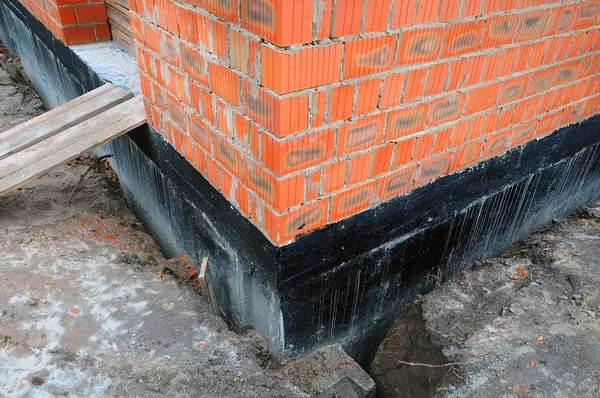Finding the Best Foundation Sealant: A Comprehensive Review
Foundation sealant is essential for protecting your home’s foundation from water damage and ensuring its longevity. With various options available, choosing the right product can be daunting. To help you make an informed decision, we’ve researched and compiled a list of the top five foundation sealant products available on Amazon, each with its unique features and advantages.
To see our related product guide article, click here.
Top Picks for Best Foundation Sealant
Liquid Rubber Concrete Basement and Foundation Sealant – 5 Gallon
This Liquid Rubber Concrete Basement and Foundation Sealant is a high-performance, waterproof coating suitable for indoor and outdoor use. It provides a durable and flexible barrier that adheres well to concrete, masonry, and other surfaces. The product comes in a 5-gallon container, offering ample coverage for larger projects.
Pros:
- Excellent waterproofing properties, ideal for basements and foundations.
- Durable and flexible, capable of withstanding foundation movement.
- Easy to apply with a brush, roller, or sprayer.
- UV-resistant, ensuring long-lasting protection even in sunny areas.
- Suitable for both DIY homeowners and professional contractors.
Cons:
- May not need large size for smaller jobs.
Foundation Armor 5-Gal. SX5000 WB DOT Approved Penetrating Concrete Sealant
The Foundation Armor SX5000 WB Concrete Sealer is a water-based silane siloxane formula designed to penetrate deep into porous surfaces, including concrete, bricks, and pavers. It creates a hydrophobic barrier that repels water while still allowing the surface to breathe, preventing water damage and efflorescence.
Pros:
- Excellent penetrating ability, ideal for porous foundation materials.
- DOT approved for use on roadways, demonstrating its quality and reliability.
- Water-based and low VOC, making it environmentally friendly and easy to apply.
- Long-lasting protection against water, freeze-thaw damage, and chloride ion intrusion.
- Suitable for both horizontal and vertical surfaces.
Cons:
- The application may require multiple coats for optimal results.
Flex Seal Liquid, 32 oz, Clear, Liquid Rubber Coating Multi-Use Sealant
Flex Seal Liquid is a versatile and clear rubber coating sealant that offers reliable waterproofing. It is suitable for a wide range of applications, including roofs, basements, RVs, and marine surfaces, and as a foundation sealant. This product is a popular choice for its ease of use and effectiveness in sealing leaks and cracks.
Pros:
- Clear and transparent finish, ideal for surfaces where the natural appearance is desired.
- UV-resistant and flexible, ensuring durability and preventing cracking.
- Easy to apply with a brush, roller, or sprayer.
- Versatile use for various indoor and outdoor projects.
- Works on multiple surfaces, including masonry and EPDM materials.
Cons:
- The clear finish may not be suitable for concealing surface imperfections.
L R Liquid Rubber Waterproof Foundation Sealant – Original Black, 1 Quart
L R Liquid Rubber Waterproof Sealant is a water-based, multi-surface leak repair coating that provides reliable waterproofing for indoor and outdoor applications. Its original black color blends well with various surfaces, making it suitable for a wide range of projects. This smaller sized option is great for fixes and repairs.
Pros:
- Water-based formula, making it easy to clean up and apply.
- Excellent adhesion to multiple surfaces, including metal, concrete, and wood.
- Can be applied with a brush, roller, or sprayer, offering application flexibility.
- Provides a seamless and watertight seal to prevent leaks and water damage.
- Suitable for DIY projects and professional applications.
Cons:
- The quart-sized container may be insufficient for larger projects.
Armor WL550 Matte Wet Look Enhancer Sealer for Concrete, Brick, Pavers, Stone, and Slate
Armor WL550 Matte Wet Look Enhancer Sealer is designed to enhance the appearance of concrete, brick, pavers, stone, and slate while providing waterproofing protection. It gives surfaces a matte wet look, adding depth and vibrancy to outdoor areas.
Pros:
- Enhances the color and appearance of various outdoor surfaces.
- Provides excellent waterproofing and protection against stains and efflorescence.
- Can be applied to damp surfaces, making it convenient for unpredictable weather conditions.
- Non-yellowing formula, ensuring long-lasting beauty.
- Suitable for both residential and commercial applications.
Cons:
- May require multiple coats for the desired level of protection.
Conclusion
Choosing the right foundation sealant is crucial for protecting your home’s foundation and ensuring its longevity. The five products mentioned above offer various features to suit different applications. Consider your specific project needs, surface type, and desired finish to select the best foundation sealant for your home. Always follow the manufacturer’s instructions for proper application and ensure a well-prepared surface for optimal results.
What Should You Look for in Foundation Sealant?
When looking for a foundation sealant, it’s essential to choose a product that meets specific criteria to ensure its effectiveness and longevity. The foundation of a building plays a crucial role in its structural integrity, and using the right sealant can help protect it from water damage, leaks, and other issues. Here are some factors to consider when selecting a foundation sealant:
- Water Resistance: The primary purpose of a foundation sealant is to prevent water from seeping into the foundation and causing damage. Look for a sealant that offers excellent water resistance to keep moisture out effectively.
- Flexibility: Foundations can experience slight movements due to soil settling or temperature changes. A flexible sealant can accommodate these movements without cracking or losing its effectiveness.
- Durability: The foundation sealant should be durable and long-lasting, capable of withstanding harsh weather conditions, UV rays, and temperature variations without deteriorating.
- Adhesion: Ensure the sealant has strong adhesion properties, forming a tight bond with the foundation material. This prevents water from finding its way through gaps or loose areas.
- Compatibility: Check that the sealant is compatible with the material of your foundation (concrete, masonry, etc.). Some sealants may not adhere well to certain surfaces, leading to potential issues.
- Application Method: Consider the ease of application. Some sealants come in cartridges for easy use with a caulking gun, while others may be applied with brushes or rollers. Choose one that suits your skill level and project requirements.
- Curing Time: The curing time refers to how long it takes for the sealant to dry and reach its maximum effectiveness. A shorter curing time may be preferable, especially if you need to finish the project quickly.
- VOC Content: Volatile Organic Compounds (VOCs) are chemicals that can be released from certain sealants, potentially impacting indoor air quality. Look for low VOC or VOC-free sealants, especially if they are used indoors or in poorly ventilated spaces.
- Manufacturer’s Reputation: Research the manufacturer’s reputation and read reviews from other customers to gauge the sealant’s overall quality and performance.
- Warranty: Check if the product comes with a warranty. A good warranty can give you confidence in the product’s reliability.
- Compliance: Ensure that the sealant complies with relevant building codes and standards in your area.
Always follow the manufacturer’s instructions and recommendations for proper application and usage of the foundation sealant. If you’re unsure about which product is best for your specific situation, consider consulting with a building professional or contractor who can provide expert advice.
Frequently Asked Questions
What is foundation sealant?
Foundation sealant, also known as foundation waterproofing or foundation coating, is a type of material used to protect the foundation of a building from water infiltration and moisture-related issues. It is applied to the exterior surface of the foundation walls and sometimes on the interior surface as well to create a barrier against water, dampness, and leaks.
The primary purpose of foundation sealant is to prevent water from seeping into the foundation, which can lead to various problems such as:
- Water Damage: Water infiltration can cause damage to the foundation walls and compromise their structural integrity.
- Mold and Mildew: Moisture can create a conducive environment for mold and mildew growth, which can negatively impact indoor air quality and pose health risks.
- Basement Flooding: Without proper sealing, water can enter the basement, leading to flooding and water damage to belongings.
- Cracks and Leaks: Moisture can exacerbate existing cracks in the foundation and create new ones, leading to more severe water penetration.
- Cold and Dampness: Unsealed foundations can contribute to a cold and damp indoor environment, making it uncomfortable and potentially increasing energy costs.
Foundation sealants are typically formulated to be waterproof and flexible, allowing them to expand and contract with the natural movement of the foundation without cracking. They are available in various forms, including liquid coatings, paints, or sealant products that can be applied with brushes, rollers, or sprayers.
Different types of foundation sealants are available, such as polyurethane, silicone, acrylic, rubberized asphalt emulsion, and more. The choice of sealant depends on factors such as the foundation material (concrete, masonry, etc.), the severity of existing cracks, climate conditions, and the specific requirements of the project.
It’s important to note that foundation sealant is applied to the exterior surface of the foundation walls and does not address structural issues or foundation settlement problems. For significant foundation problems, it’s essential to consult with a professional engineer or foundation specialist to identify and address the underlying issues properly.
What should I use to seal my foundation?
Choosing the right product to seal your foundation depends on various factors, including the type of foundation you have, the specific issues you need to address, and the climate in your area. Here are some common options for sealing foundation, each with its advantages and best use cases:
- Polyurethane Sealants: Polyurethane sealants are flexible and durable, making them suitable for sealing foundation cracks. They adhere well to various materials and can withstand movement, making them ideal for foundations that may experience slight settling or shifting. Polyurethane sealants are excellent for both indoor and outdoor applications.
- Silicone Sealants: Silicone sealants offer excellent water resistance and are known for their long-lasting properties. They remain flexible over time, making them suitable for foundations that experience regular movement. Silicone sealants work well in areas with high moisture levels and are particularly effective for sealing small cracks.
- Acrylic Sealants: Acrylic sealants are affordable and easy to apply. They are best used for minor foundation cracks and to provide a protective coating over the foundation surface. However, they are not as flexible as polyurethane or silicone, so they may not be suitable for areas with significant movement.
- Hydraulic Cement: Hydraulic cement is a fast-setting material used to plug leaks and actively stop water infiltration. It can be an effective solution for stopping active leaks, but it may not be suitable for filling larger foundation cracks.
- Epoxy Injection: Epoxy injection is a specialized method used for repairing structural cracks in concrete foundations. It involves injecting epoxy resin into the cracks to bond and strengthen the foundation. This method is more complex and may require professional assistance.
- Rubberized Asphalt Emulsion: This type of sealant is commonly used for below-grade applications to provide a waterproof barrier. It is effective for protecting foundation walls from moisture but may not be suitable for actively leaking areas.
Before applying any sealant, it’s crucial to clean the foundation surface thoroughly and prepare it according to the manufacturer’s instructions. If you have significant foundation issues or are unsure about the best sealant for your situation, it’s recommended to consult with a foundation specialist or a professional contractor. They can assess your foundation, identify the most appropriate solution, and ensure proper application for long-lasting protection.
What is the best waterproof membrane for foundation?
The best waterproof membrane for a foundation depends on various factors, including the type of foundation, the severity of water issues, the local climate, and the specific construction requirements. Different waterproofing membranes offer varying levels of performance and durability. Here are some commonly used and effective waterproof membranes for foundations:
- Bituminous Coating or Membrane: Bituminous membranes, often made from modified asphalt or rubberized asphalt, are popular choices for foundation waterproofing. They offer excellent water resistance and are flexible, which allows them to withstand foundation movement. Bituminous coatings can be applied as liquid coatings or as pre-manufactured sheets.
- Polyurethane Waterproofing Membrane: Polyurethane membranes are flexible and durable, providing effective waterproofing for various foundation types. They are particularly useful for areas with significant foundation movement or where minor cracking is expected.
- Cementitious Waterproofing Membrane: Cementitious waterproofing coatings are cement-based products that form a waterproof barrier when applied to the foundation surface. They are suitable for both positive and negative side waterproofing (interior and exterior applications) and can be used on concrete and masonry foundations.
- Sheet Membrane Systems: These are pre-formed waterproofing membranes typically made of materials like PVC, HDPE, or EPDM. They are available in various thicknesses and can be applied to the exterior surface of the foundation. Sheet membranes are known for their durability and resistance to water penetration.
- Liquid Rubber Membrane: Liquid rubber membranes are spray-applied or rolled-on products that cure to form a seamless and flexible waterproof barrier. They are easy to apply and are suitable for various foundation materials.
- Bentonite Clay Membrane: Bentonite clay-based waterproofing systems use sodium bentonite, which expands when it comes into contact with water, creating a tight seal against water intrusion. These membranes are often used in below-grade applications.
- Composite Membranes: Some waterproofing systems combine multiple materials, such as bentonite with geotextile layers or other synthetic materials, to create highly effective waterproofing solutions.
When selecting a waterproof membrane for your foundation, consider factors such as the application method, the extent of waterproofing required (interior and/or exterior), the soil conditions around the foundation, and any building code requirements in your area.
It’s essential to ensure proper surface preparation and application of the waterproofing membrane to achieve the best results. For significant foundation waterproofing projects or if you’re unsure about the best approach, it’s recommended to consult with a professional waterproofing contractor or engineer to assess the specific needs of your foundation and select the most suitable waterproofing solution.
editor's pick
news via inbox
Stay one step ahead with exclusive tips, guides, and offers delivered directly to your inbox.
Sign up for our newsletter and elevate your home improvement game today!







